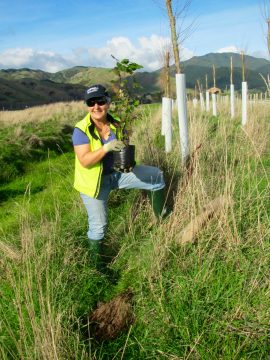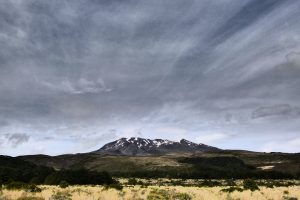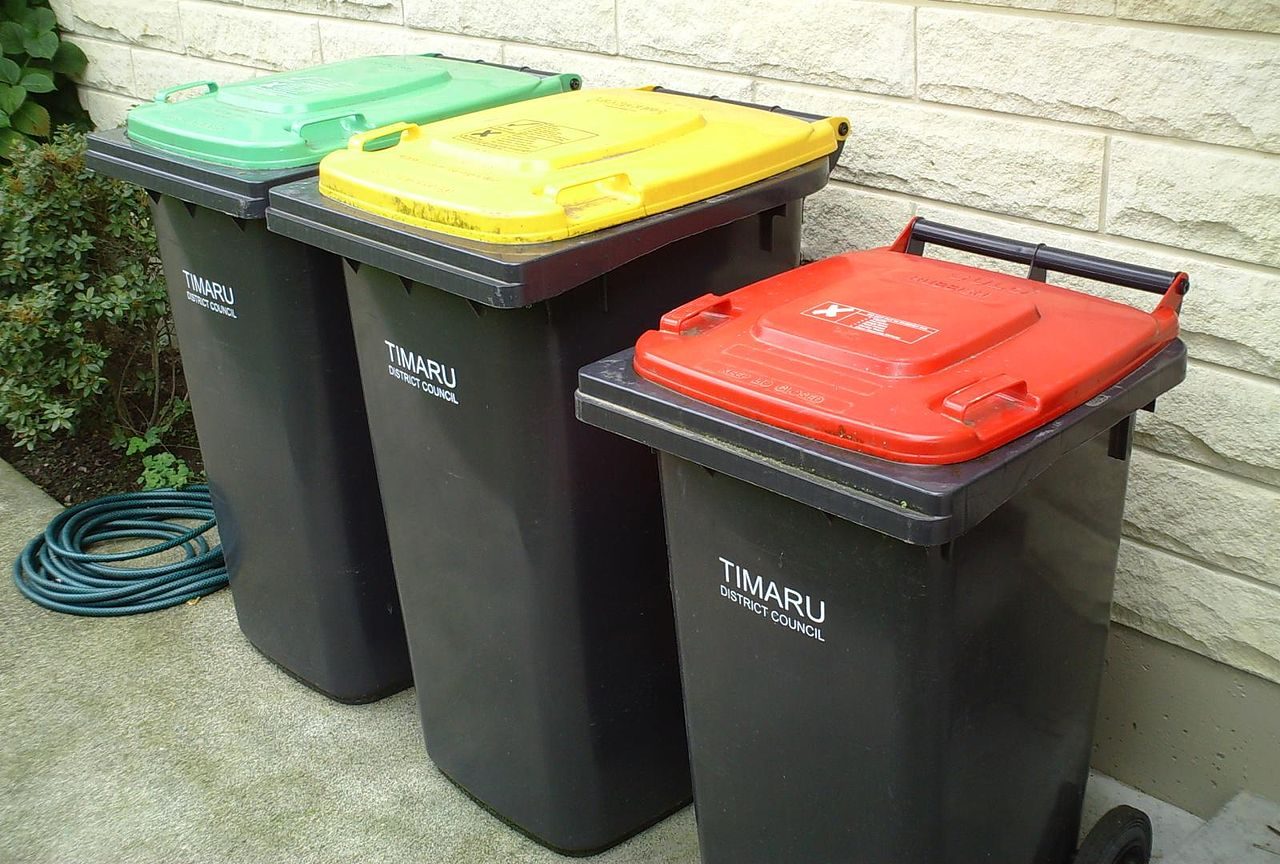Why Do We Do It?
Jean Fleming unpacks the motivations of environmental volunteers in New Zealand.

Jean Fleming became an environmental volunteer after retiring to the Kāpiti Coast in 2015.
Waking in my new home on that first morning, I jumped out of bed and flung open the doors to the deck, breathing in the sounds and smells of life at Waikanae Beach. Immediately, there was a peel of tūī calls from the tall gums across the road and, as I listened, a riroriro started up its hesitant call right beside me. I knew then that my new life on the Kāpiti Coast was going to be just fine.
I moved back to Waikanae Beach in early 2015, having spent more than 20 years as an academic in Dunedin. The place had changed a bit since my childhood and, it struck me, for the better. Tall pōhutukawa and banksia trees flowered all summer, and there were restored wetlands thriving where, as kids, we’d galloped our ponies around a go-cart racetrack on the Waikanae estuary. The biggest surprise was the number and diversity of birds now calling the Kāpiti Coast home.
Within a couple of months of arrival, I had been asked to lead a team restoring the streams on the Queen Elizabeth Park farm, as part of the Kāpiti Biodiversity Project, and had also been appointed a Trustee of the Ngā Manu Nature Reserve at Waikanae. It has been a steep learning curve from health scientist and science
communicator to environmental volunteer.
I had to learn the basics of riparian planting: what trees to purchase, when to plant, how to deal with weed and grass growth, and how to measure the stream health through fish and invertebrate surveys. At Ngā Manu, the nearby expressway and the encroachment of housing developments made me think about pest control in a different way, and I learnt how Ngā Manu fitted into a number of nearby bush remnants as part of a key native ecosystem.
Both projects depend on the constant energy and hard work of volunteers, who turn up in all weathers, with smiles on their faces and their hi-viz vests on, to dig holes on the stream banks, establish traplines up steep escarpments and check them regularly, monitor lizard numbers, and establish homes for weta or little blue penguins. These wonderful new friends got me thinking. What drove them? What did they get out of their environmental work and what would make their experience better?

The Kapiti Biodiversity Project’s Tuesday nursery group pricking out seedlings (Photo by Jean Fleming).
My academic past tapped me on the shoulder, and before I knew it I had set up an online survey on the motivations of environmental volunteers. I quickly realised I needed the experiences from volunteers throughout the country, both for the numbers and also for the diversity of environmental projects that people contributed to. I made the survey simple and open, with 10 questions, including gender, age, and education. The results were remarkably consistent, from Northland to Rakiura. To date, more than 270 people have responded, but the survey will remain open until the end of the year. If you haven’t responded yet, please do.
From the findings (see below), I conclude that, if organisations want to improve the experience of their environmental volunteers, the first step is to acknowledge the experience and expertise of those who volunteer. The volunteers who responded to this survey are not people who are working for a “free lunch”. Goodwill, willingness to collaborate and share skills, and a love of New Zealand’s fauna and flora characterise the responses.
Volunteers want to be respected for their hard work but also for who they are. After all, we are all working together to make New Zealand a better place for its endangered flora and fauna, as well as its human population.
Who volunteers?
More than a third of respondents were retired. The next biggest group were professionals or tradespeople (21%), followed by managers (12%), and those in education (10%). More than 4% of respondents were farmers.
Volunteers were highly educated, with more than 30% having some form of tertiary qualification and 50% having postgraduate training, including 12% with a Masters degree and 8% with a PhD.
More women than men responded to the survey, with a gender ratio of about 60:40 female to male.
Respondents covered a broad range of ages, but nearly a third of respondents were in the 65–74 years old category reflecting the greater time available for volunteering in retirement. Of those surveyed, 70% did other kinds of volunteer work as well.
Just under 30% of respondents said they were not members of any conservation, environmental, or wildlife societies or organisations. Only 3% listed Forest & Bird projects as their main volunteering activity, but a further 17% listed Forest & Bird projects as a secondary activity, and 54% stated they belonged to the society, by far the largest percentage of any organisation. Forest & Bird plays a major communication role in the lives of this cohort of New Zealanders.
Why do they do it?
Survey respondents were asked for the reasons they became a volunteer in their main environmental project. Analysis revealed regular use of terms such as environment, conservation, and native or nature but also more unexpected terms such as wanted, love, local, or community.
“Being a voice for nature – curbing the tide of extinctions.”
“Feeling like I am making a positive difference.”
“I am retired and it is time to give back to the community.”
What are the benefits?
Responses to the question “What do you get out of being a volunteer?” are shown below. Volunteers enjoyed meeting “like-minded” or “interesting” new friends and clearly got satisfaction from the work they did. Volunteering was seen as a social activity, bringing better physical and mental health through doing, learning, seeing, contributing, and being active outdoors.
“Meeting a group of like-minded passionate people and being outdoors.”
“Knowing that I am helping to save some species from extinction. Working with like-minded people. Keeping my mind and body active.”
Live, laugh, share – volunteer
Forest & Bird would like to take this opportunity to thank our thousands of hardworking volunteers in all corners of New Zealand. Our vital conservation work couldn’t happen without your efforts.
Forest & Bird’s Chief Executive Kevin Hague said: “I have been visiting branches across the country recently and have been humbled by the commitment to saving nature I have witnessed from our many unpaid volunteers. “Unquestionably, without these dedicated volunteers, Forest & Bird would not be able to undertake the breadth and depth of work we do. Their work is extraordinary and important, whether it’s setting traplines, weeding, planting, making a submission, raising issues with local media, or helping with administrative tasks in National Office. “Together we are stronger, and our members, donors, staff, and supporters are working side by side to seek a better and more secure future for New Zealand’s natural heritage. Thank you to the many thousands of you that do this work for nothing else but the love of nature.”
For more information about National Volunteers Week, visit www.nationalvolunteerweek.nz


